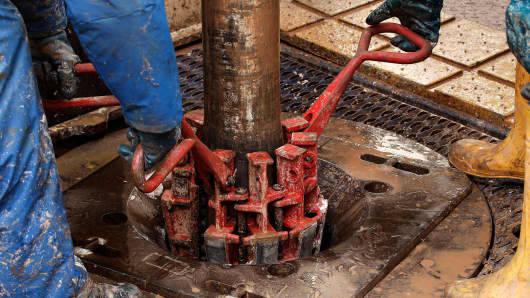U.S. shale gas may not be the panacea being touted by Japan's politicians and companies to sharply reduce the country's crippling energy bills.
Japan's government last month said it will provide loan guarantees of 1 trillion yen ($10.47 billion) for investments in shale gas, which the Nikkei business daily has said could cut imported gas costs by as much as 40 percent.
But the advantage is eroded to as little as 10 percent once shipping and other costs are accounted for, according to a Reuters survey of estimates.
(Read More: China Faces Major Hurdle in Shale Gas Ambitions)
"The shale gas revolution is an illusion," said Toshinori Ito, president of Ito Research and Advisory, an independent energy research company based in Tokyo.
Japanese utilities such as Tokyo Electric Power, Tokyo Gas, and trading houses including Mitsui & Co are signing contracts and building extra facilities to import U.S. shale gas.
They are being encouraged by a government alarmed at a trade deficit that surged to a record after the March 2011 Fukushima nuclear crisis shut most of the country's atomic power stations, pushing up utilities' annual fuel cost by 3 trillion yen.
The government is also considering offering insurance to companies planning to import U.S. gas, the Nikkei reported in February.
The yen's 20 percent fall against the dollar this year has added to the urgency as it increases the cost of imported fuel for a country that already buys a third of the world's liquefied natural gas.
(Read More: Weak Yen: Japan Can't Have Cake and Eat It Too)
Japan's energy imports account for 7 percent of gross national product and the cost of natural gas has risen more than 77 percent in yen terms since January 2011, according to Eurotechnology Japan KK.
Cost Comparison
But it's not clear U.S. shale can deliver the hope for cost benefits.
U.S. producers are likely to charge a premium of as high as 30 percent over market quotes for piped gas, according to one estimate. The only U.S. project that has so far secured a license to export plans to charge a 15 percent premium.
U.S. domestic prices could also rise if costs of extraction are pushed up by environmental concerns, while falling oil prices make other sources of LNG that are priced against crude cheaper by comparison.
"Cheaper yes for now," said Penn Bowers, an analyst at CLSA Asia=-Pacific Markets. "But let's say oil prices fall back to $70 given the fact that the US is also developing a lot of new liquids and Iraq is increasing production - then you are left wishing you had just stuck with the oil-linked price."
(Read More: Senate Examines Implications of Shale Revolution)
Australia and Russia are both keen to increase gas supplies to Japan.
Firms are spending $190 billion to develop Australian LNG exports, while a second Russian LNG terminal planned for construction in Vladivostok is a short voyage away from Japan.
"The economics of Vladivostok LNG look attractive when the project is supplied via a spur line from a future east Siberia-China pipeline," said Gavin Thompson, Wood Mackenzie's Head of Asia Pacific Gas Research.
Rising Prices
LNG prices in Asia are about 70 percent higher than levels in March 2011, increasing the lure for U.S. gas that was last quoted at $3.95 per million British thermal units. Japan's average price for LNG imports in January was $16.37 per mmBtu.
Japanese companies have signed up to receive 14.7 million tons a year of U.S. LNG supplies, either in final agreements or provisional accords, according to the Institute of Energy Economics, Japan. That's a little over a sixth of Japan's imports of 87 million tons last year.
While shale may not be as big a saver as some suggest, lower prices for other LNG should ease the pressure on Japan's trade balance and utilities' bottom line.
(Read More: Australia's Dollar Quietly Over the Moon About LNG)
Nick Grealy, publisher of No Hot Air, a U.K.-based shale gas consultancy, estimates the cost of shipping U.S. shale to Japan at $8-$12 per mBtu.
"People won't be paying $3.50 in Japan. They won't be paying oil index prices either and that alone can save billions off the Japan trade balance."
The key benefit of U.S. shale may be the pressure it puts on other suppliers to cut prices. Even at $9 per mmBtu, shale imports will likely only reduce the cost of imports by about 10 percent, according to a study by Akira Yanagisawa, a senior economist at the Institute of Energy Economics, Japan.
"Japan should maximise its benefits by using U.S. LNG imports as leverage to gain advantageous terms for other LNG imports," Yanagisawa said.


